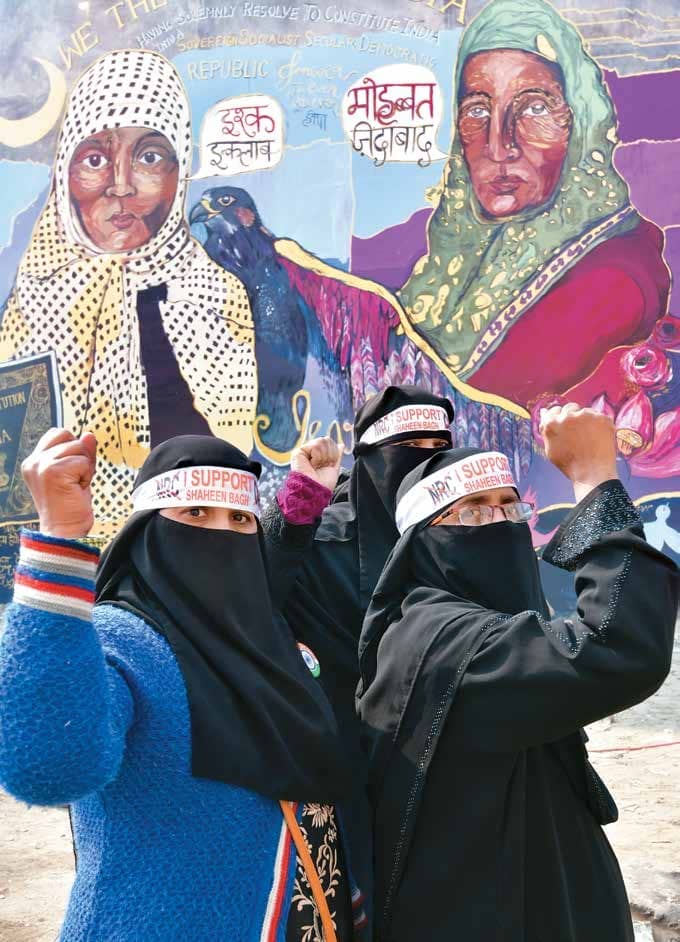
MANY Indians would know what I mean when I say that, by the time I reached the last month of 2019, I had exhausted the energy to keep up with the news of spreading communalism (and ‘news’ that spread communalism). The widely prevalent references to Nazi Germany and concentration camps to discuss the impending statelessness of millions of Indian Muslims was disconcerting on many counts. Honestly, it was devastating to have to come to terms that a vast majority of Indians were so full of hate that they did not care if a section of their compatriots were disenfranchised or condemned to an even worse fate. Or to have to acc ept that Indian Muslims were considered sitting ducks who could be dep orted en masse to detention camps without a whimper—as a famously told chronology would have it.
But that’s when the protests began. It began the day the Citizenship (Amendment) Bill 2019 was passed in the Rajya Sabha—first, Jamia Millia Islamia (JMI), a central university in Delhi, spoke up. Women students marched out of their hostels, braving the rain and biting cold. Three of them—Ayesha Renna, Ladeeda Farzana and Chanda Yadav—were iconised in a frame, their fists raised in slogans. It was this defiant image that first caught the attention of students and multitudes of citizens across the country. They wanted their voices to travel far, said Ayesha and Ladeeda. It did.
The police crackdown came soon. First, on a citizen’s march called by students. Then, inexplicably, mayhem inside the Jamia campus, in the library and mosque, with studying and praying students brutalised. The images were stark and shocking. We heard of worse from Aligarh Muslim University and elsewhere in UP. (Later, as visuals streamed out after an internet shutdown, the police action there recalled the wanton terror of private militia—‘ghar mein ghus kar marenge’ was no longer an empty threat.)
Denne historien er fra February 17, 2020-utgaven av Outlook.
Start din 7-dagers gratis prøveperiode på Magzter GOLD for å få tilgang til tusenvis av utvalgte premiumhistorier og 9000+ magasiner og aviser.
Allerede abonnent ? Logg på
Denne historien er fra February 17, 2020-utgaven av Outlook.
Start din 7-dagers gratis prøveperiode på Magzter GOLD for å få tilgang til tusenvis av utvalgte premiumhistorier og 9000+ magasiner og aviser.
Allerede abonnent? Logg på

Layers Of Lear
Director Rajat Kapoor and actor Vinay Pathak's ode to Shakespeare is an experience to behold

Loss and Longing
Memories can be painful, but they also make life more meaningful

Suprabhatham Sub Judice
M.S. Subbulakshmi decided the fate of her memorials a long time ago

Fortress of Desire
A performance titled 'A Streetcart Named Desire', featuring Indian and international artists and performers, explored different desires through an unusual act on a full moon night at the Gwalior Fort

Of Hope and Hopelessness
The body appears as light in Payal Kapadia's film

Ruptured Lives
A visit to Bangladesh in 2010 shaped the author's novel, a sensitively sketched tale of migrants' struggles

The Big Book
The Big Book of Odia Literature is a groundbreaking work that provides readers with a comprehensive introduction to the rich and varied literary traditions of Odisha

How to Refuse the Generous Thief
The poet uses all the available arsenal in English to write the most anti-colonial poetry

The Freedom Compartment
#traindiaries is a photo journal shot in the ladies coaches of Mumbai locals. It explores how women engage and familiarise themselves with spaces by building relationships with complete strangers

Love, Up in the Clouds
Manikbabur Megh is an unusual love story about a man falling for a cloud. Amborish Roychoudhury discusses the process of Manikbabu's creation with actor Chandan Sen and director Abhinandan Banerjee